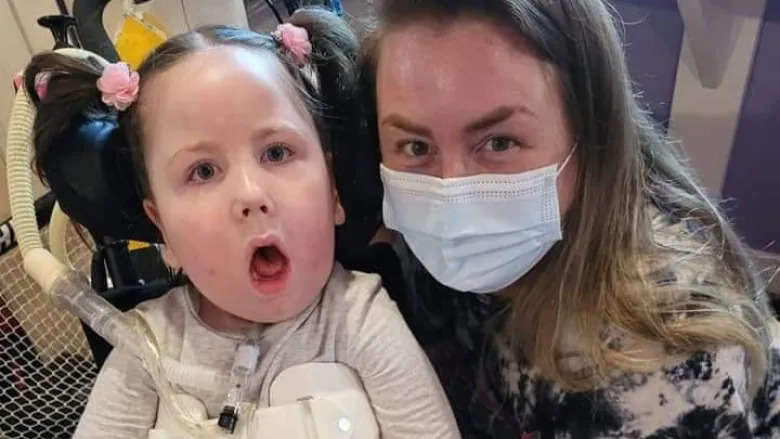
Ontario is considering a new policy that could see school staff perform some health services for students, according to a provincial government draft obtained by CBC News.
The document, which is for consultation purposes, proposes that school staff do tasks for students with disabilities. They may include cleaning of catheters, manual expression of the stomach and bladder (to help squeeze out urine), tube feeding, injecting medication, and oral or nasal suctioning.
When Nicole Lamont of Windsor first read the government draft, she thought it “was a joke.”
Her six-year-old daughter, Lilah, has a rare genetic disease known as spinal muscular atrophy Type 1. Lilah has a tracheostomy (surgically created opening in the neck), is on a ventilator and is tube-fed through her stomach. She also requires round-the-clock care from a nurse.
The thought of having an educator perform any health-related tasks on her daughter at school has Lamont worried and makes her uncomfortable.
“I was just kind of infuriated, to be honest with you,” said Lamont. “All kids with special needs already are living in a world that isn’t made for them as it is. They already have to fight for every single bit of care they do have.”
Lamont and her husband went through months of training in order to bring their daughter home from hospital, prompting many questions about how educational workers will be trained if this draft becomes a reality.
“RNs, RPNs, PSWs — they all went to school to be able to learn how to provide this care properly,” she said.
The government draft outlines training for the different health-related examples of tasks that could be given to educators. Depending on the task, it could include instruction from a primary health-care provider, parents or caregivers, or community health-care organizations.
Government updating 38-year-old policy
A spokesperson for the Ontario education minister told CBC News they’re looking to update a policy on health care in schools that hasn’t been touched since 1984.
“Our government is working collaboratively with the Ministries of Children, Community and Social Service as well as the Ministry of Health to provide supports for students that require health and rehabilitation services in school … to align with current best practices to best serve Ontario students,” said Grace Lee, spokesperson for Education Minister Stephen Lecce. “We will continue to consult with stakeholders and partners to make sure we get this right for the most vulnerable children in our schools.”
But one Windsor union called the proposal a way to cut costs by spending less on medically trained nurses and putting more on the plates of already overloaded educational support staff.
“My biggest concern is mostly for the students,” said Tyler Campbell, president of the Ontario Secondary School Teachers’ Federation’s education support staff bargaining unit in Windsor-Essex.
“We should be focused on education. We should be focused on helping our most vulnerable students. We can’t do that if we’re performing small medical procedures in our schools,” Campbell said. “Educational support staff do with all kinds of different scenarios during the day, but their main focus has to be on education.”
Education assistant ‘livid’ about draft policy
Fran Vangent said her 20-year job as an education assistant has changed drastically.
Adding some medical-related procedures to the mix simply wouldn’t work, said Vangent, who’s with the Greater Essex County District School Board.
“I was livid. I was absolutely livid,” said Vangent after reading the provincial government’s draft proposal. “I can’t even imagine.”
At the beginning of her career, Vangent remembers a “very low-key” work environment in a single classroom. Today, she’s regularly pulled into as many as four classrooms in a day. Large workloads and short staffing all contribute to what Vangent describes as burnout.
She said this is where the “guilt” and “like I’m not doing my job” feelings come in. “And burnout is me rehashing my entire day all the way home, wondering where I could have done better, where I should have been, did I pick that up, did I really need to take that 15-minute break, because if I would have stayed in the classroom, maybe I could have gotten to him.”
The Ministry of Education said this policy review was prompted, in part, because families told them the outdated health-care framework is a barrier for children with disabilities to attend school.
The province has heard from hundreds of families and stakeholders, and plans to develop a finalized policy in the coming months.
But from Lamont’s perspective, educators shouldn’t be providing medical care because “they didn’t go to school for that.”
In addition, she worries about liability, and wonders “who is responsible if something goes wrong.”

